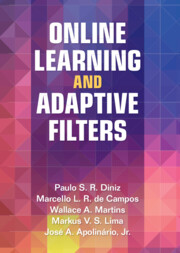6 - Adaptive Filtering on Graphs
Published online by Cambridge University Press: 24 November 2022
Summary
The chapter discusses how to process data from irregular discrete domains, an emerging area called graph signal processing (GSP). Basically, the type of graph we deal with consists of a network with distributed vertices and weighted edges defining the neighborhood and the connections among the nodes. As such, the graph signals are collected in a vector whose entries represent the values of the signal nodes at a given time. A common issue related to GSP is the sampling problem, given the irregular structure of the data, where some sort of interpolation is possible whenever the graph signals are bandlimited or nearly bandlimited. These interpolations can be performed through the extension of the conventional adaptive filtering to signals distributed on graphs where there is no traditional data structure. The chapter presents the LMS, NLMS, and RLS algorithms for GSP along with their analyses and application to estimate bandlimited signals defined on graphs. In addition, the chapter presents a general framework for data-selective adaptive algorithms for GSP.
Information
- Type
- Chapter
- Information
- Online Learning and Adaptive Filters , pp. 198 - 249Publisher: Cambridge University PressPrint publication year: 2022
